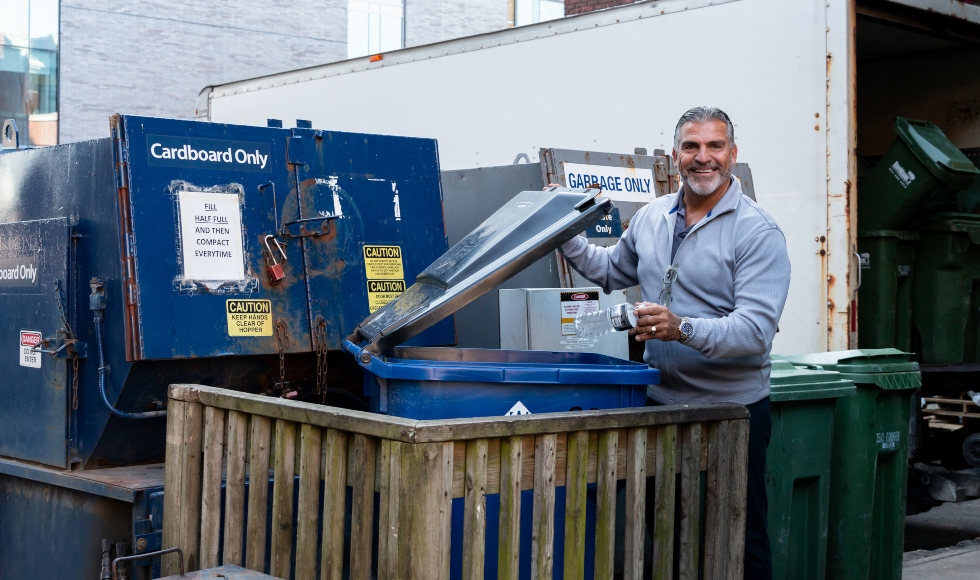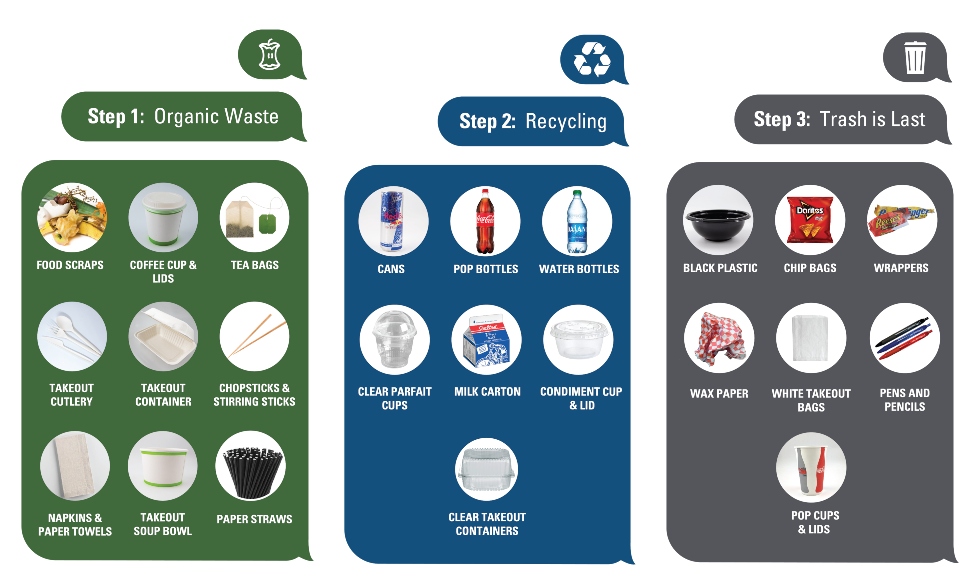“Pitch in” to sustainability measures at Mac

Carlos Figueira manages campus waste for Facilities Services. Similar to many residential recycling and composting programs, McMaster’s waste continues to be divided into several different streams and the biggest challenge for the university is contamination when the wrong type of wastes are combined. Photo by Sarah Janes.
McMaster continues to make strides in sustainable practices on campus, focusing on diverting waste by increasing recycling and composting, reducing energy and water consumption, and promoting active transportation, among other initiatives.
The university has also created interdisciplinary, community-based undergraduate courses to study sustainability through experiential education on campus and throughout Hamilton.
Several new projects launched across campus this September:
- Hospitality Services goes greener, adding compostable cutlery
- Campus Store eliminates single-use plastic bags
- Facilities Services updates signage for recycling and waste containers
A waste audit conducted in November 2018 showed that McMaster diverts approximately 54% of waste from landfill through recycling and compost programs, an improvement of 8.5% over 2017 results. The university continues to implement measures to increase correct waste sorting.
“Everyone needs to pitch in,” says Carlos Figueira, director, custodial, grounds, logistics and mail services. “We’re changing human behaviour.”
Campus-wide, over 1000 waste and recycling bins will be relabelled, phasing out the current “this, that, and the other” wording in favour of clearer “bottles & cans,” “paper” and “trash” along with photo illustrations and descriptions of what belongs in each.
Similar to many residential recycling and composting programs, McMaster’s waste continues to be divided into several different streams and the biggest challenge for the university is contamination when the wrong type of wastes are combined.
New signage has already been introduced in Centro, one of the busiest eateries on campus, highlighting the new compostable cutlery, take-out containers, straws and coffee cups, and making it clearer which plastics can be recycled and which are garbage.
In the first two weeks of the term, compost at that location has already doubled compared to last year, and garbage has been reduced in direct proportion. There has also been an increase in recycling.
“The additions we’ve made to our compostable take-away products have been well received,” says Chris Roberts, director, hospitality services.
“We’ve had positive feedback from students, staff and faculty, who are happy that they we’re supporting the environment through a number of different initiatives and that we’ve made the sustainable choice, the easy choice,” Roberts says.
Waste management is just one aspect of campus environmental sustainability. The university is launching a new Sustainability Advisory Committee, chaired by Debbie Martin, AVP and chief facilities officer, comprised of staff, faculty and students interested in sustainability. The group is planning to take an inventory of the many sustainability initiatives currently on campus, develop coordination for these initiatives, and work on new ideas for continuing to improve sustainability at McMaster.
“Each year we advance our plan for a sustainable campus,” says Figueira. “Our campus fleet is now home to 13 electric vehicles and we have five electric vehicle charging stations. We continue our retrofit of campus lighting – last year nine buildings were updated with LED lighting saving nearly 1-million kilowatt hours.”
Sustainability Day events take place October 23 from 10 a.m. to 2 p.m. in the Student Centre atrium.
Learn more about discounts for bringing a reusable container.
Learn more about sustainability at McMaster in the 2018 Office of Sustainability Annual Report, the 2018 Environmental Sustainability Plan and the 2019 Energy Management Plan on the Facilities Services website.

New signage in Centro encourages correct waste sorting.


